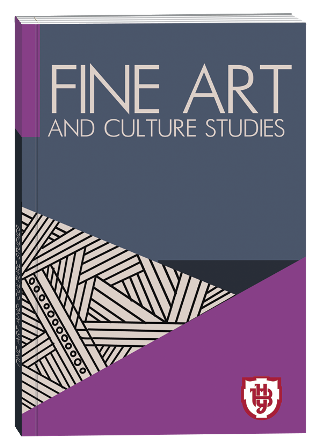PSYCHOLOGICAL ASPECTS OF INTERACTION OF MUSICIANS-INSTRUMENTALISTS IN ENSEMBLE MUSIC MAKING
DOI:
https://doi.org/10.32782/facs-2022-1-9Keywords:
interaction, ensemble, ensemble music making, ensemble performanceAbstract
The article highlights the psychological aspect of the issue of interaction in ensemble music making, reveals the most valuable and relevant in the theory and practice of ensemble music making in relation to this topic; the basic facts, positions and concepts concerning interaction in ensemble music making are systematized, based on achievements of world and modern practical psychology, philosophy, culturology. The essence of the concept of "interaction" is revealed; the ways and means of achieving joint, coordinated actions of the ensemble members, their communicative contacts – both interpersonal and professional performance – are outlined. The conditions of practical interaction of ensemble musicians are comprehensively considered and analyzed; it is substantiated that this interaction can only be creative, otherwise – due to the one-sided and undivided influence of one subject on another – the true meaning of the concept of "interaction" is lost. The role of interaction as a psychological foundation of ensemble activity is determined. The category "ensemble music making" is considered in musical-pedagogical and professional-performing aspects. The main components that form a complex system of learning to play in an ensemble are identified and characterized. In this regard, the problems of interpersonal and professional communication of musicians who take part in the process of performing ensemble music are analyzed. Factors that contribute to the strengthening of creative mutual understanding between all participants in the process of studying and performing ensemble music are analyzed.The purpose of the work is to justify the need for an integrated approach to the study of ensemble activities. This approach, where the study of the psychological component can take place only if it is closely related to the pedagogical and performing components, ie in their trinity allows you to identify the main problems of ensemble music and identify ways to solve them. It is emphasized that interaction is a system-forming factor, the ways to solve them. It is emphasized that interaction is a system-forming factor.
References
Білодід І.К. Словник української мови (Т. 1). Київ : Наукова думка, 1970. Т. 1. 346 с.
Давидян Р. Психологические аспекты квартетного музицирования. Музыкальное исполнительство и современность. Москва : Музыка, 1988. Вип. 1. С. 128-155.
Келдыш Ю. В. (Ред.) Музыкальная энциклопедия. Москва : Советский Композитор. 1973. Т. 1. 1054 с.
Медушевский В. В. Энциклопедический словарь юного музыканта. Москва : Педагогика, 1985. 356 с.
Моісєєва М. А. Інтеграція музикознавчих і психолого-педагогічних знань як чинник творчої інтуїції музиканта. Вісник Житомирського державного університету імені Івана Франка. 2005. Вип. 21. C. 51-54.
Молчанова Т. О. З історії ансамблевого музикування: монографія. Львів: «Сполом», 2005. 160 с.
Польская И. И. Камерный ансамбль: история, теория, эстетика. Харьков.: ХДАК, 2001. 396 с.
Польська І. Камерний ансамбль: феноменологія жанру. Наукові збірки Львівської національної музичної академії ім. М. В. Лисенка. Львів, 2010. Вип. 24. С. 4-14.
Сельченок К., Шведерський А. (Авт.-сост.). Психология художественного творчества. Минск : Харвест, 1999. 752 с.
Цыпин Г. (Авт.-сост.) Психология музыкальной деятельности. Теория и практика. Москва : Академия, 2003. 368 с. (Шинкарук, 2002: 77).
Шинкарук В.І. (Ред.). (2002). Філософський енциклопедичний словник. Київ : Абрис. 2002.







